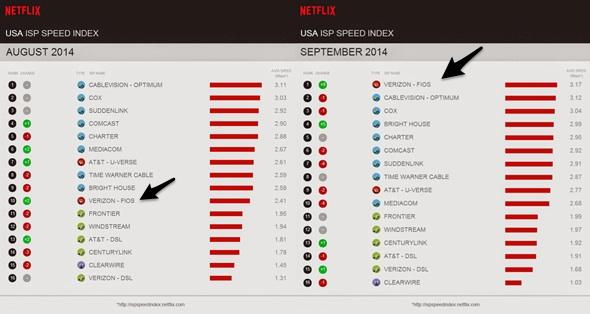Netflix made a peering deal with Comcast in February. The idea was to give Netflix’s customers faster streaming speeds by allowing the service direct access to Comcast’s network. And it worked. Within a month Comcast subscribers watching Netflix were experiencing the speed boost. Netflix has made similar deals with Time Warner, AT&T, and Verizon. And they’re working, too! Look how Verizon has hurdled to the top of the Netflix Speed Index (above right). But that’s bad.
As Netflix CEO Reed Hastings has emphasized repeatedly, Netflix isn’t proud of what it has had to do to give its customers a good experience. Peering deals erode net neutrality and disincentivize ISPs to provide primo speeds to companies that can’t pay. As a way to avoid having official net neutrality regulations imposed on them, ISPs have been denying that they give preferential speeds to certain services and sites over others. But there’s proof that they do. And more evidence just keeps coming out.
TechDirt has been going through submissions to the FCC net neutrality open-comment period, and noticed that security services company Golden Frog, which makes VyprVPN, had made a pretty stunning observation. The company presents evidence that ISPs are subtly working to block users’ attempts to implement encryption, perhaps because it is data-intensive. The company’s report to the FCC explains:
Golden Frog shows that a wireless broadband Internet access provider is interfering with its users’ ability to encrypt their SMTP email traffic. This broadband provider is overwriting the content of users’ communications and actively blocking STARTTLS encryption. This is a man-in-the-middle attack that prevents customers from using the applications of their choosing and directly prevents users from protecting their privacy.
Basically Golden Frog is saying that the ISP (it doesn’t identify which one in its comments) is undermining users’ encryption and then placing itself between senders and receivers and relaying their messages back and forth so they are unaware that a third party is involved.
ISPs are giving special treatment to certain services at the same time that they are lobbying against net neutrality regulations, but they also may be actively influencing which services people can use online and how they can use them. As Golden Frog points out, “Absent enforceable Commission rules, broadband providers can … block and discriminate against entirely acceptable Internet uses. In this case, users are not just losing their right to use the applications and services of their choosing, but also their privacy.”
